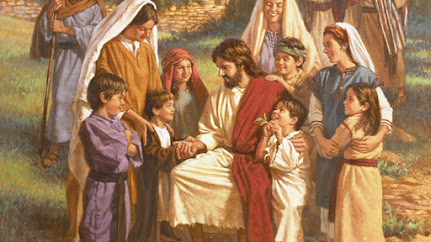Let us look at how God lifts up the lowly. He took what might have been a merely mundane trip and a simple act of service and elevated it. The Scriptures describing the visitation of Elizabeth by Mary make it clear that what was happening was actually a triumphal journey of the new ark of the covenant, Mary herself, bringing Elizabeth the presence of God in the form of the baby in Mary's womb.
When Elizabeth heard Mary’s greeting,
the infant leaped in her womb
John the Baptist leaped for joy in the womb of Elizabeth just as David danced with abandoned before the ark of the covenant (see Second Samuel 6:14-15). To modern ears this no doubt seems improbable. But who was to say a baby couldn't have the spiritual awareness to recognize the coming of his savior and jump for joy in his presence? For God all things were possible. Elizabeth and Mary weren't going to succumb to merely secular interpretations of events. Elizabeth became so filled with the Holy Spirit at the presence of the Mother of God that she was able to recognize the true spiritual nature of this visitation. A normal visit of assistance in preparing to bear a child might have merited heartfelt thanks, to be sure, but not the degree of ecstatic exultation with which we see Elizabeth knew to respond.
Most blessed are you among women,
and blessed is the fruit of your womb.
And how does this happen to me,
that the mother of my Lord should come to me?
There is much for us to learn from Mary and Elizabeth about the spiritual realities contained beneath the surface of apparently mundane events. We need to allow ourselves to become sensitive to this reality in the way that Elizabeth and John the Baptist were sensitive. We too ought to respond with joy to the greeting of Mary and to the presence of her son, even when this presence is hidden within the apparently ordinary things of daily life.
From this day all generations will call me blessed:
the Almighty has done great things for me,
and holy is his Name.
It is when we begin to recognize the hidden presence of God that is a constant reality in our lives that we will begin to understand and resonate with Mary's Magnificat. In her Magnificat Mary sang of realities that would not have been obvious to the world rulers of this present darkness. No one had yet informed them that the mighty had been cast down from their thrones. And yet, with the presence of Jesus, their power had already begun to be shattered. At this point only those hungry souls who recognized Jesus as the bread from heaven (from Bethlehem, the house of bread!) would realize that God had already filled the hungry with good things. But this fulfillment of a promise was also a promise of an even more perfect fulfillment. Because God is certain to remember his promise for ever we can trust that the day will come when the hidden victory of God will be made manifest and every eye will see.
Behold, he is coming with the clouds, and every eye will see him (see Revelation 1:7).
A good way to begin to practice finding this hidden spiritual reality is to join in with Mary, the embodiment of daughter Zion, as we are invited to share in the joy that was first her own.
Shout for joy, O daughter Zion!
Sing joyfully, O Israel!
Be glad and exult with all your heart,
O daughter Jerusalem!



.jpg)










.jpg)
